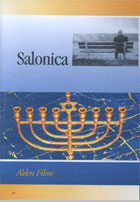
Salonica 2007
Distributed by Alden Films, Box 449, Clarksburg, NJ 08510; 732.462.3522
Produced by Rose-Marie Schneider
Directed by Paolo Poloni
DVD, color, 87 min.
College - Adult
Jewish Studies, Holocaust and Genocide Studies
Date Entered: 05/07/2009
Reviewed by Maureen Puffer-Rothenberg, Valdosta State University, Valdosta, GAIn Salonica filmmaker Paolo Poloni captures the current state of Jews in the Greek city of Thessaloniki, and the contrast between younger and older generations. Poloni’s main subjects are elderly Jews who survived German occupation from 1941-1944, and the younger generation who variously preserve, study, recall—and forget—Greek/Jewish language, architecture, and history.
In extensive interviews Poloni’s subjects tell where their families came from, the elders explaining how they came to be in Salonica in the 1940’s. The history of the Jews in Greece is diverse and often confusing; as one young man explains it, “. . . my grandfather was born in Greece; didn’t speak so much Greek, when he left; but his father was an Ottoman citizen . . . he spoke Spanish, and he was Jewish. What is going on, how can this be? You have Spanish, you have Greek, you have Ottoman . . . “
Older subjects tell of losing their families and possessions, being confined in ghettos and in their homes, deportation to Auschwitz, exile, conscription into the Israeli army, and returning to find their homes had been plundered and their neighbors wished them dead. Yannis shows photographs from his long career as a photojournalist; Evgenia describes the night terrors her husband suffered for years after his release from Auschwitz; Sylvia shows an old photograph of her family, all killed by German soldiers; Davico sings one of the traditional songs lost with the passing of his generation.
Setting urban life today against the city’s fading history, Poloni visits students restoring a crumbling building, a homeless woman who begs to support her toddler daughter, a middle-aged nursing home worker, and a young woman who grew up in Russia as she tearfully recalls her family’s return to Greece. University of Thessaloniki students seek evidence of a large Jewish cemetery, bulldozed during the German occupation, which lies directly beneath the University. Moishe describes himself at 13 during the German occupation, his only desire “to be a communist and have a pure attitude, in order to fight,” while teenaged Dani smirks with a friend over their attempts to meet girls.
Poloni’s interviews are filmed primarily in dark offices and dimly-lit rooms, evoking both intimacy and a funereal aspect. Interviews are interspersed with high-quality footage of Thessaloniki’s urban skyline, street scenes, boats off the coastline, abandoned buildings, and cats. Eerie background music by Minos Matsas creates a sense of foreboding, even when Poloni’s subjects are simply riding the bus. With one or two exceptions the language is Spanish or Ladino (a Spanish-Jewish dialect), subtitled in English.
The film is an emotionally affecting testament to a dying culture. Poloni very successfully captures a specific time and place, and a range of attitudes among older and younger Jews in the city, as well as documenting some of their history and efforts to preserve it—all in an atmosphere of quiet mourning. Salonica will be most useful to students of Jewish history and is recommended for those with an interest in Greek Jews, German occupation of Greece, or the diaspora.